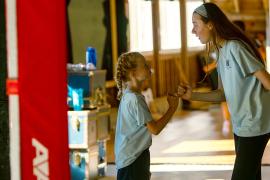Camp can be an ideal setting to help children cope with the death of a loved one. Since 1991, Camp ReLeaf, a weekend camp hosted by Triangle Hospice of Durham, North Carolina, has been helping children develop positive coping skills for dealing with the recent death of a family member. Camp ReLeaf offers all the fun of a traditional residential camp, while creating a safe place for youth to express and deal with their grief. Over the years, therapeutic recreation has become one of the cornerstones of this camp’s program.
The Role of Therapeutic Recreation
By using education and recreational activities, therapeutic recreation helps people with illnesses, disabilities, and other conditions enhance their health, independence, and well-being. Hospice coordinators recognize the benefit of therapeutic recreation components to the camp schedule. One certified therapeutic recreation specialist (CTRS) and several college students facilitate sessions for all age groups. Many campers share their feelings for the first time while participating in these therapeutic recreation sessions.
Teaching Coping Skills
When campers arrive at Camp ReLeaf, they are divided into three groups based upon grade (K-2, 3-5, 6-8). Siblings and cousins are placed in different groups, if possible, to allow campers more security in expression of feelings and to reduce behavior issues and unhealthy competition.
The older group attends sessions in problem solving/trust building, journaling as a coping strategy, and "Cool Tools for Coping," an interactive discussion focusing on coping skills development. Other sessions include making a collage of life, making T-shirts and hats, and playing games using open-ended questions to facilitate discussion of feelings, interests, and memories of their deceased loved ones.
Sessions in the two younger groups’ schedule include: "Cool Tools for Coping," a humor workshop lead by a professional clown, and an anger management workshop to teach them to safely express and cope with their anger through physical activity. Campers also attend therapeutic recreation sessions, where they take part in activities, such as collage of life and hand puppets, which are facilitated by a CTRS.
Collage of life
In this activity, campers search through magazines and catalogs to find pictures of their favorite activities, as well as those that make them feel good. They then make a collage of these items on paper. Once the collages are finished, the certified therapeutic recreation specialist leads campers in a discussion. Because children often feel afraid or guilty if they laugh and have fun, discussing what makes them feel good can be difficult. The CTRS helps campers understand how these special activities can actually be powerful coping mechanisms.
Hand puppets
Campers make hand puppets out of socks, decorating them to reflect their individual personalities and preferences. A wide variety of materials, such as buttons, pom poms, ribbons, doll eyes, glitter and sequins, yarn, and a hot glue gun, are available to help campers make puppets that are special to each of them. Staff members explain to campers how their puppets can help them when times get tough: the puppets can listen when no one else is available, they can give companionship when the child is lonely, they can help tell an adult something that is difficult to say out loud, and they can be used to have fun.
Making a Memory Board
Each child at camp makes a memory board using photos and other items brought from home that remind the child of their deceased loved one. Not all campers bring photographs, so they are encouraged to make a board that is representative of the person who died by writing words to express their feelings, listing the interests of the person, or describing a happy memories of that person. In addition, pictures cut from magazines and catalogs, stickers, glitter, fabric material and notions, and items found on nature walks often complete the boards.
The making of the memory boards provides an excellent opportunity for camp staff (and parents when campers return home) to talk bout the person who died. Making memory boards can be emotionally powerful and emotionally draining for both campers and staff. Each child takes the memory board home to remember the loved one, to remember camp and what was learned, and to help with cope when times get tough.
Balloon Release Ceremony
After campers complete their memory boards, they are given a piece of rice paper on which to write messages to their loved one who died. Staff members help write, as well as help with the emotions that this task often evokes. The rice paper message is then attached to a helium balloon. (The rice paper and special balloons are both biodegradable).
The entire camp then gathers on the field for the balloon release ceremony. The camp director talks about the concept of "ritual" and explains how rituals can help people deal with loss. She states that the balloon stands for the person who died and that it carries a personal message from the camper. She further explains that the balloon is not the person, but by this ritual, an event was created to help the camper deal with grief and loss.
A counselor from each cabin calls out the name of each child’s loved one and the child’s special name for that person, such as "MeMaw" or "Daddy." As the balloons drift up and away, Collin Raye’s song, "Love Remains," is played. Campers and staff spend time talking, hugging, consoling, or in silence and wander off in pairs or small groups.
We Are Better People
At the end of this time of reflection, the three cabin groups meet in separate locations around camp. A counselor gives each camper a small cloth bag containing three stones and a poem. Two of the stones are smooth, polished, and beautiful. The other rock is rough and plain. The poem says, "Each of us has bright and shiny pieces in our lives, as well as places in our hearts that will always be rough and painful; and because of this, we are better people."
For children who are experiencing grief, the availability of understanding staff who are willing to listen, peers in a similar situation, and coping activities provide a valuable step toward healing. Therapeutic recreation can play a large role in this process.
Originally published in the 1999 March/April issue of Camping Magazine.


